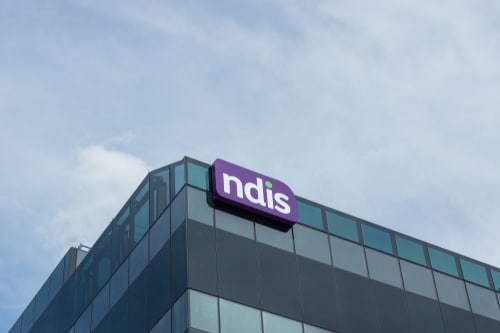Disability Services Minister Bill Shorten announced on 18 April 2023 that the National Disability Insurance Scheme (NDIS) will be ‘rebooted’ this year with changes intended to save the budget scores of billions over the next decade. He listed fraud, inefficiency and rising costs as among the fund’s problems.
It’s argued that the NDIS is currently not sustainable. This year it will cost $34 billion and it currently has an annual growth trajectory of 14%. If the scheme instead achieves the government’s intended annual growth rate – of 8% by 1 July 2026 – it will cumulatively save around $50 billion over the next decade.
That said, disability rights activists have criticised the announcement as not giving enough detail about what’s being planned or what the implications of reduced spending will entail. Here’s a rundown on what you need to know about NDIS changes at the time of writing:
Table of contents

What problems does the NDIS face?
Nearly 600,000 people living with disability in Australia rely on the NDIS. Though it’s a crucial service for some of the most needy and deserving people in Australia, Shorten said it’s also often abused and the country needs an NDIS reboot.
“The system is too rigid. It throws up Kafkaesque barriers to access, lacks empathy, gouges on prices, is too complex, and often traumatising to deal with. As a consequence, people with disability often feel they’re caught between some predatory providers on one hand and an impersonal government agency on the other,” he said.
“There are many great service providers from long-standing, not-for-profits to new family-run, small businesses. But untrustworthy providers taint the reputations of quality service providers who work hard to support participants, and are meeting their registration and compliance obligations. Participants who have been preyed upon by these unscrupulous types have reported feeling ‘de-humanised’ and exploited as ‘cash-cows’.”
You can read Shorten’s full speech on NDIS changes here.
Price gouging and criminal activity
The government’s NDIS Fraud Fusion Taskforce, founded in October last year, had 38 investigations happening in late April involving more than $300 million in payments. This taskforce uncovers and investigates criminal syndicates that have taken advantage of the NDIS’s administration weaknesses.
There has also been talk of parents ‘shopping around’ doctors for higher-level diagnoses for their children, in order to gain access to the NDIS.
Disability advocate El Gibbs recently spoke on a podcast about the NDIS reboot and disagreed that criminal fraud is the scheme’s major problem.
“When it comes to the fraud that’s being reported and the evidence around the fraud it’s a very small amount … I think there’s a problem around the lack of market regulation and the profiteering from some players in the NDIS space,” she said.
Service providers
Exploitive disability service providers have consistently been called out on their role in the rapidly growing cost of the NDIS. One big question mark is around pricing. Specifically, the higher pricing of services for NDIS participants versus clients who aren’t government funded.
Read about NDIS mark-ups here, where some participants say their services are double or even triple the price of services provided to those not on the scheme. Hence, the need for price regulation has been a big discussion point.
Example: Plan managers
One example Gibbs gave of profiteering was plan management. As many readers will know, a plan manager’s role is to ensure the payment of services and supports necessary to help a person living with disability to live their life as independently as possible.
Specifically, they oversee and facilitate the payment of their clients’ NDIS funds to their disability service providers. A plan manager can also track the NDIS participant’s plan budget and ensure their service agreements with providers suit that participant’s individual needs.
Gibbs says plan management now accounts for 1-2% of the total cost of the NDIS. She also explains that many plan management companies originally established to assist people with disability have now been taken up by large health insurance and private equity companies who inflate costs.
“The last quarterly reports showed that the top ten plan managers were taking $158 million,” she said. “That’s an enormous amount of money just to approve or disapprove invoices.”
NDIS reboot: What’s the plan?
The Australian government has released a six-point NDIS reboot plan to address administrative inefficiencies. The actions listed within were:
#1
Firstly, to increase the number of staff and specialists working at the NDIS. This includes making sure appropriate training and that the agency has the technology and capacity to do its work.
#2
To plan for the long term and take away unnecessary checks that people are ‘still disabled’. This will give participants more certainty and allow them to focus on making their current plans work.
#3
To rope in soaring costs, crack down on waste and tackle providers who charge more than they should. This includes making sure supports are evidence-based so benefits are maximised for participants.
#4
Fourthly, to provide more in-home care for treatment outside of hospitals and care homes.
#5
To target unethical providers who are ripping off the the system with shoddy care and therapies. This involves targeting fraud within the scheme and unethical practices by those who charge too much for services.
#6
Lastly, to boost community support from state governments to free up NDIS budgets.
NDIS reboot: Concerns raised on commitment
Disability advocates query how all these NDIS reboot points will be put into play. An article in The Conversation asked questions about whether there’s genuine commitment from government to work together on their design with people living with disability.
“The government seems committed to disability services reform but it won’t be quick or easy,” wrote journalist Lukas Koch. “It will involve more than just changes to the NDIS – we need a rethink of all disability services. And this can’t be done without people with disability who need to play a strong role in designing this new scheme.”
Read about the Australian Disability Strategy that’s measuring gaps exist in disability inclusivity.

NDIS reboot: Where are the spending cuts?
The biggest concern for activists is which services will be cut to meet the NDIS reboot’s spending targets.
Disability rights advocate Elly Desmarchelier asks: “We are nowhere near reaching an 8% target by cracking down on dodgy providers who are overcharging. Where is the money going to come from for this funding reduction today? That’s what people with disability want to know right now … Will it be less meals, less services, less community activities … what is it that we’re going to lose out on?”
“Where is the money going to come from for this funding reduction today?
Disability rights advocate Elly Desmarchelier
That’s what people with disability want to know right now. “
Independent chair of Every Australian Counts, the grassroots campaign that fought for the introduction of the NDIS, George Taleporos also spoke on the NDIS reboot. He said people living with disability and their families are “exhausted and stressed” by having to constantly defend the fund’s need.
A big concern is what NDIS changes to funding and supports will arrive with the reboot.
“The government and the community needs to understand that the NDIS is an investment, not a frivolous expense,” he said. “It provides life-saving and life-changing supports that are essential for Australians with disabilities to live a good life in the community.”
Read more:
- Australia’s Older Persons Need More Than Care
- NDIS Guru – Things I Wish I Knew Before Becoming Involved in the NDIS
- NDIS Guru – What Do I Look for in an NDIS Plan Manager?
- Which NDIS Plan Management Option is Right for Me?
Insure your independence
NDIS reboot or not, having quality mobility equipment that suits your unique needs is vitally important to your independence. Quality insurance cover for it is vital too, in our opinion.
Blue Badge Insurance offers mobility scooter insurance and wheelchair insurance to cover your goods for damage or loss. We also provide affordable insurance for wheelchair accessible vehicles and disability converted cars, plus up to 25% off disability car insurance. This applies to all disability parking permit holders – even if you haven’t modified your car.
Contact us today to get a quote.








